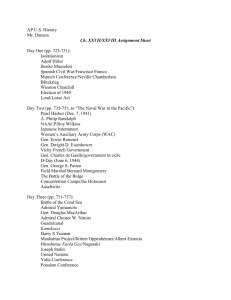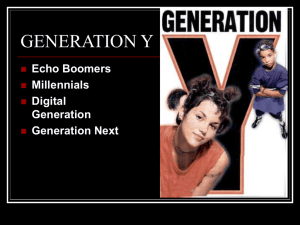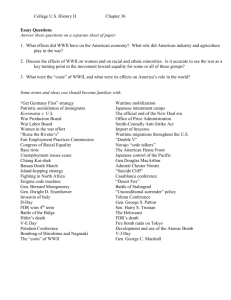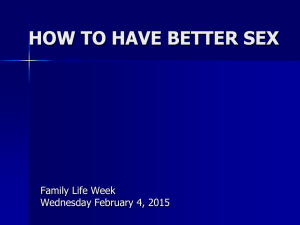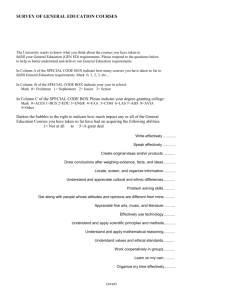Shifting Gears
advertisement
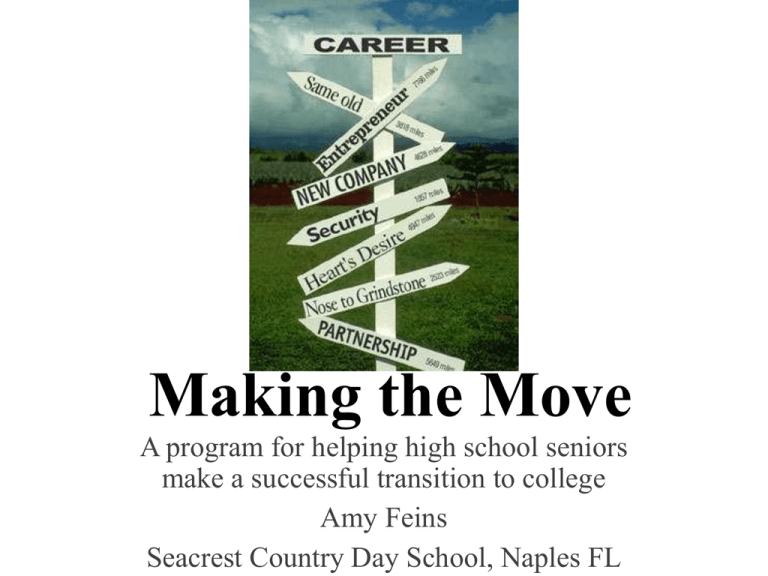
Making the Move A program for helping high school seniors make a successful transition to college Amy Feins Seacrest Country Day School, Naples FL •“S tudents can easily slip through the cracks during the transition from high school to college, overwhelmed and unable to adapt to new surrounding….What students do during the initial year can impact the rest of their college career. We must recognize the transitional and intellectual barriers students face and utilize orientation programs to create a structured introduction to college that encourage freshmen to succeed.” • --Feldman and Zimbler/U Mass/McGraw-Hill Foundation Why have a transition program? • Transition programs are a relatively new concept. • Many campuses have transition programs, but they are not mandatory. • Our goal: to prepare all our students for college before they leave high school. By The Numb3rs • 62.8% of HS seniors heading off to college. Of that percentage, only 72% return for sophomore year. • The low retention rate is not because students can’t do the work; it’s because students lack simple skills including: – time management – test-taking strategies – Engaging socially with instructors or peers. Where WE Come In • We customize our transition program to address the challenges our alumni face in college. • Seacrest alumni have reported the following challenges from their freshman year: – Amount of reading – Time management – Getting along with roommates – Figuring out Greek Life – Declaring majors too early (especially Pre-Med) The Timeline Class of 2012 A full day spent both onand off-campus in a “scavenger hunt” format. Class of 2011 One day program with guest speakers Class of 2013 A full quarter of college prep in our seminar class, which concludes one full year of college counseling that began the winter of junior year. The Six-Week Plan • Focus on one topic per week. Topics include: – Strategically scheduling classes – Planning budgets – Managing time – The ins and outs of banking – Social involvement – Home economics skills Week 1: What’s Your Major? • The purpose: Learn to strategically schedule classes • Students select a major and determine a four-year course of study at their chosen institution. • Show all core/distribution requirements, as well as requirements for their majors. • Students must also fit in study abroad, internships, and capstone projects if necessary. General Education Requirements: English - 2 courses ENG 102 - Seminar ENG 203 - Survey of American Lit Fine Arts - 1 course THEA 303 - Directing (THEA/ENG 376 - Playwriting) Foreign Language - 1 course SPAN 200 - Communication and Culture Humanities 101 - 1 course HUM 101 - Humanities Science - 2 courses (1 Life Science, 1 Physical Science) ENVS 150 - Introduction to Earth Science PSY 104 - Introductory Psychology History - 1 course HIST 101 - History of Early Civilization Philosophy - 1 course PHIL 220 - Philosophy and Film Religion - 1 course REL 201 - Old Testament Cultures & Peoples - 1 course PHIL 335 - Buddhism Mathematics - 1 course MATH 120 - Appreciation of Mathematics Physical Education - 2 courses PHED 102- Fitness PHED 103 - Tennis FALL SPRING 1. Humanities 101 (Gen Ed) 2. Spanish 200: Culture/Commun. (Gen Ed) 3. Phys. Ed.102: General Fitness (Gen Ed) 4. English 203: American Lit (Gen Ed) 5. Art 245: Intro to Studio Art 1. Psych 104: Intro. Psychology (Gen Ed) 2. Phys. Ed. 103: Tennis (Gen Ed) 3. English 341: Literary Theory (Major) 4. English 371: Short Story (Major) 5. Art 251: Drawing 1. Religion 201: Old Testament (Gen Ed) 2. English 323: Southern Literature (Major) 3. English 372: Adv. Short Story (Major) 4. Physics 108: Astronomy 5. Art 252: Painting 1. Env. Sci. 150: Intro to Earth (Gen Ed) 2. Philosophy 220: Film (Gen Ed; Minor) 3. English 304: Renaissance (Major) 4. Religion 202: New Testament 5. Art 255: Digital Photography 1. Theatre 303: Directing (Gen Ed) 2. History 101: Early Western Civ (Gen Ed) 3. Philos. 335: Buddhism (Gen Ed; Minor) 4. English 376: Playwriting (Major) 5. Philosophy 205: Phil. of Food (Minor) 1. English 333: The Modern Novel (Major) 2. Philos. 345: Phil. of Language (Minor) 3. English 377: Adv. Playwriting 4. Accounting 211: Accounting Principles 5. Theatre 300: Theatre Production 1. English 378: Novella (Major) 2. English 384: Mass Media (Major) 3. Philosophy 321: Symbol Logic (Minor) 4. Finance 210: Personal Finance 5. Religion 241: Newer Religions 1. English 331: Early Eng. Novel (Major) 2. Philosophy 304: Literature (Minor) 3. English 386: Editing and Publishing 4. English 379: Screenwriting 5. Phys. Ed. 110: Kayaking Week 2: It Costs HOW Much? • The purpose: Learn to plan a budget • Students determine the total cost of attendance for their college, including room and board, books, travel, and incidental expenses. • Students figure out how to budget an allowance. • Students fit a job into their schedule. Week 3: What Time/Day /Week Is It? • The purpose: Hone time management skills • Students make a schedule outlining their hypothetical class time, work time, study time, play time, sleep time, etc. in a typical week. • Students plan out a time schedule to follow for a 15 page term paper due halfway through the semester. Monday Tuesday Wednesday Thursday Friday Saturday 9 am Breakfast Breakfast Breakfast Breakfast Breakfast Breakfast 10 am English 341 Art 251(until 11:30) English 341 Art 251(until 11:30) English 341 Work in Library Work in Library 11 am 12 pm Lunch Lunch Lunch Lunch Lunch Work in Library 1 pm Psych 104 English 371 (until 2:30) Psych 104 English 371 (until 2:30) Psych 104 Lunch Phys Ed 103 A Capella rehearsal 2 pm 3 pm Phys Ed 103 Phys Ed 103 Work in Library 4 pm Work in Library 5 pm A Capella rehearsal A Capella rehearsal A Capella rehearsal 6 pm Dinner Dinner Dinner Dinner Dinner 7 pm Work in Library Work in Library Work in Library Work in Library Work in Library 8 pm Work in Library Work in Library Work in Library Work in Library Work in Library 9 pm Study Study Group Study Study Group Study Dinner Sun Mon Tues Wed Thurs February 2013 Fri Sat 1 Paper assigned 2 3 4 Begin thesis research 5 6 7 8 Get thesis approved 9 10 11 Begin research 12 13 14 15 Finish outline 16 17 18 19 20 21 22 23 24 25 Sun 26 Mon 27 Tues 28 Wed Thurs Fri Sat March 2013 1 Finish rough draft 2 3 4 Bring to writing center 5 6 7 8 9 10 11 12 13 14 15 Finish second draft; writing center 16 17 18 19 20 21 22 Finish third draft; writing center 23 24/31 Sun 25 29 30 April 2013 26 Mon 27 Tues 28 Wed Thurs Fri Sat 1 2 3 4 5 Complete final draft 6 7 8 9 10 11 12 Polish 13 14 15 16 17 18 19 Polish 20 21 22 23 24 25 26 Turn in the paper 27 Week 4: Where Did My $$ Go? • The purpose: Learn how banking works • Students learn how to open a checking/savings account • Students also learn how credit cards work and become aware of credit rating Week 5: How Do I Fit In? • The purpose: Learn to navigate the social scene on campus • Students explore their college’s website to discover what clubs/activities might be interesting, both on- and off-campus, as well as figure out transportation. • Students research on-campus locations that offer non-academic help. • Case Studies – Roommate Issue: “Sexiled” – How to Get Home on Your Own – Suspicious Activity Wofford Clubs: 1. Goldtones, the Women’s A Capella Group Groups perform, tour, or attend music festivals abroad each year. Counts as credit hours. Good way to meet people with my interests 2. The Journal Literary Magazine One of the oldest college literary magazines in the south. Creative writing classes have priority for staff. I’m interested in communications (including publishing and editing) 3. Campus Union, Student Government Special Events Committee plans all-campus activities. Good way to get involved. Restaurants: 1. Brickhouse Pizzeria (walk) 2. Wade’s Restaurant (walk) 3. Converse Deli and Coffee Bar (walk) Non-Academic Help: 1. Mungo Center - 864-597-4261 2. Wellness Center - 864-597-4370 Week 6: Home Sweet Home • The purpose: Learn practical skills that will be needed beyond college. • Using a hands-on approach, students learn to do laundry, mend clothes, clean bathrooms, and cook for themselves. Transition Day • Part 1: The Scavenger Hunt • Each student must travel around town via public transportation complete activities such as: – Visiting the Registrar, Library, Health Center, Gym, Dining Hall, and Bookstore at a local college – Apply for a job – Grocery shop – Learn to sew on a button Transition Day • Part 2: The Alumni Panel • Past students come back to our campus to answer questions and give us information including: – Their biggest challenges – Their biggest surprises – Advice for next year’s class – What they wish they’d known going in – What advice they wish they’d listened to Transition Day • Part 3: The Parent Panel • Parents of our past students come on campus to answer questions and give us information including: – Their biggest challenges – Their biggest surprises – Advice for next year’s class – What advice they wish they’d listened to How to get started Start small--a one day seminar will do. Find guest speakers (college students, parents, staff, physicians, bankers, etc.) Have hands-on activities that each student can customize to his or her own needs Go over case studies involving different social situations (roommate problems, academic difficulties, substance abuse) Provide your students with a “Toolkit” for transition The Toolkit • By implementing a transition program, you allow students to build their own “Toolkit” of information before they leave high school. • What’s in the Toolkit? – Names and phone numbers of offices on their campus that can help them. – A sample course plan to go over with their advisor – Copies of health insurance card, social security card, and other important documents they might need – A list of the activities or clubs they want to explore during the first weeks of school – They also have acquired and practiced time management, planning, banking/budgeting and social skills that will help them every day on their respective campuses

